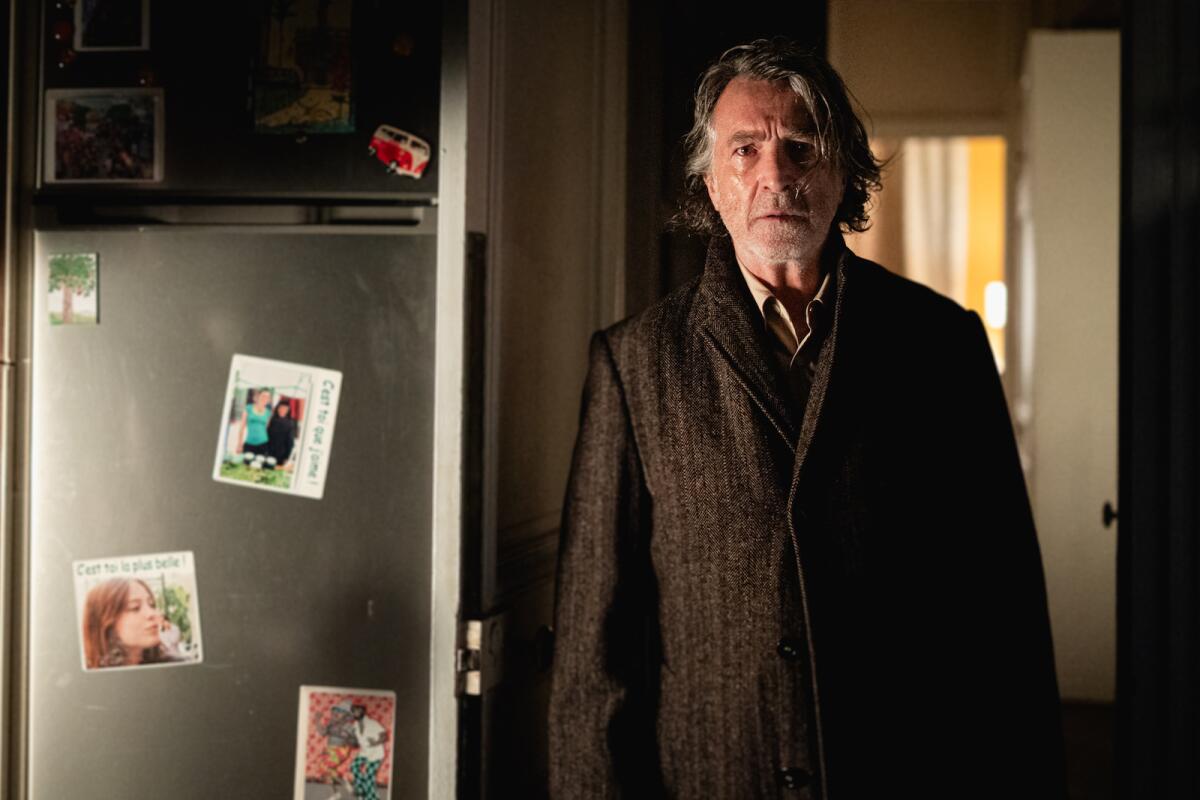Review: Terrific dramatic thriller ‘Man in the Basement’ may remind you of people you know

The tenant-from-hell movie (“Pacific Heights,” anyone?) gets a provocative new twist in “The Man in the Basement,” a gripping, smart and timely film that’s part thriller, part domestic drama and all cautionary tale.
Director Philippe Le Guay (“Bicycling With Molière,” “The Women on the 6th Floor”), who co-wrote the stacked deck of a script with Gilles Taurand and Marc Weitzmann, was inspired by a true-life incident involving a French Jewish couple who unwittingly sold their storage cellar to a neo-Nazi. He proceeded to physically move into it, they could not legally get him to leave, and trauma ensued.
For your safety
The Times is committed to reviewing theatrical film releases during the COVID-19 pandemic. Because moviegoing carries risks during this time, we remind readers to follow health and safety guidelines as outlined by the CDC and local health officials.
The movie version finds married Parisian condo dwellers Simon (Jérémie Renier) and Hélène Sandberg (Bérénice Bejo of “The Artist”) selling their basement space to seemingly mild former history teacher Jacques Fonzic (François Cluzet from “The Intouchables”), only to learn that he’s a Holocaust denier and conspiracy theorist. Although the deed on the space has yet to be executed, Simon has already signed a promise of sale, deposited Jacques’ payment check and handed him the cellar key. So, according to French law, Jacques is technically the “owner” and allowed to stay — at least until the Sandbergs can find a legal way to oust him and void the entire transaction.
Adding fuel to the fire, Simon is Jewish, with a great-uncle who died in the Holocaust. Meantime, Simon owns the condo with his mother (Denise Chalem) and brother (Jonathan Zaccaï), who bring their own issues — familial and otherwise — to the dilemma. In an effective and credible result, the bewildering situation begins to hold a mirror up to Simon, exposing his personal flaws and cracking the veneer of his idyllic life as a successful family man and architect.
What follows is an increasingly tense game of cat-and-mouse between the well-off Simon and the destitute Jacques during which Simon, hiring one hamstrung lawyer after another, begins to unravel while Jacques doubles down on his faux victimization and smarmy sanctimony. The irony: Simon begins to look like the troublemaker and Jacques, who also traffics in anti-Semitism online, the misunderstood innocent.
Le Guay and his co-writers deftly capture the insidious, manipulative ways that hatemongers and revisionists can calmly gaslight their critics and, to some more impressionable observers, seem fleetingly reasonable in the process. To wit, Jacques claims that people just want the “official version” of history. “We must reach our own conclusions,” he declares. “That’s being free.”

Jacques also describes his late wife as “allergic to preconceived ideas.” He and his ilk also seem “allergic” to such pesky things as facts and evidence, which makes rational conversation between such opposites as Simon and Jacques a nonstarter. Where can two adversaries go from there?
In a pointed twist, Jacques, using his chilling brand of “logic,” manages to turn Simon and Hélène’s bright but prickly teen daughter, Justine (Victoria Eber), from utterly disdaining him to possibly considering his point of view — at least regarding the freedom to ask challenging questions.
Amazingly — or perhaps not — many of Simon and Hélène’s fellow condo owners also find themselves less outraged by Jacques’ presence on the premises than they initially were, either not wanting to take a stand or, in the case of at least one resident, maybe sharing some of Jacques’ beliefs. Hélène’s boorish father (Patrick Descamps) too proves that you don’t have to be a full-fledged supremacist to have racist tendencies.
It all adds up to make Simon feel alienated from those around him, including Hélène and Justine, and undercuts his plan to use group strength to send Jacques packing. That’s when Simon must ultimately go rogue, and it’s as frightening as anything we’ve seen so far.
Le Guay effectively keeps the pressure on his characters and their loaded situation throughout, using ominous camera angles and anxious music cues to heighten the dread and uncertainty. He receives a fine assist from Renier and Cluzet, who commit to their divergent roles with unnerving intensity.
It’s a terrific film.
'The Man in the Basement'
Not rated
In French with English subtitles.
Running time: 1 hour, 54 minutes.
Playing: Laemmle Royal Theatre, West Los Angeles; Laemmle Town Center 5, Encino
More to Read
Only good movies
Get the Indie Focus newsletter, Mark Olsen's weekly guide to the world of cinema.
You may occasionally receive promotional content from the Los Angeles Times.










